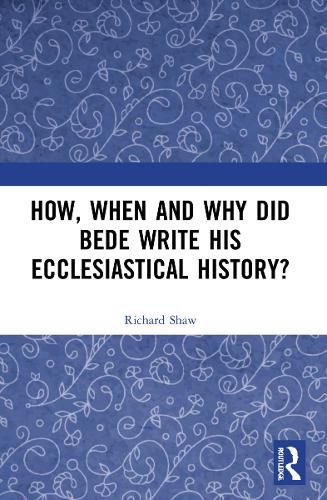Readings Newsletter
Become a Readings Member to make your shopping experience even easier.
Sign in or sign up for free!
You’re not far away from qualifying for FREE standard shipping within Australia
You’ve qualified for FREE standard shipping within Australia
The cart is loading…






Bede's Ecclesiastical History is our main source for early Christian Anglo-Saxon England, but how was it written? When? And why? Scholars have spent much of the last half century investigating the latter question - the 'why'. This new study is the first to systematically consider the 'how' and the 'when'. Richard Shaw shows that rather than producing the History at a single point in 731, Bede was working on it for as much as twenty years, from c. 715 to just before his death in 735. Unpacking and extending the period of composition of Bede's best-known book makes sense of the complicated and contradictory evidence for its purposes. The work did not have one context, but several, each with its own distinct constructed audiences. Thus, the History was not written for a single purpose to the exclusion of all others. Nor was it simply written for a variety of reasons. It was written over time - quite a lot of time - and as the world changed during that time, so too did Bede's reasons for writing, the intentions he sought to pursue - and the patrons he hoped to please or to placate.
$9.00 standard shipping within Australia
FREE standard shipping within Australia for orders over $100.00
Express & International shipping calculated at checkout
Bede's Ecclesiastical History is our main source for early Christian Anglo-Saxon England, but how was it written? When? And why? Scholars have spent much of the last half century investigating the latter question - the 'why'. This new study is the first to systematically consider the 'how' and the 'when'. Richard Shaw shows that rather than producing the History at a single point in 731, Bede was working on it for as much as twenty years, from c. 715 to just before his death in 735. Unpacking and extending the period of composition of Bede's best-known book makes sense of the complicated and contradictory evidence for its purposes. The work did not have one context, but several, each with its own distinct constructed audiences. Thus, the History was not written for a single purpose to the exclusion of all others. Nor was it simply written for a variety of reasons. It was written over time - quite a lot of time - and as the world changed during that time, so too did Bede's reasons for writing, the intentions he sought to pursue - and the patrons he hoped to please or to placate.